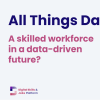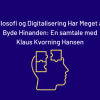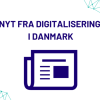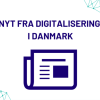Digital Transformation and Data Strategy: A conversation with Ensensor Insight’s CEO
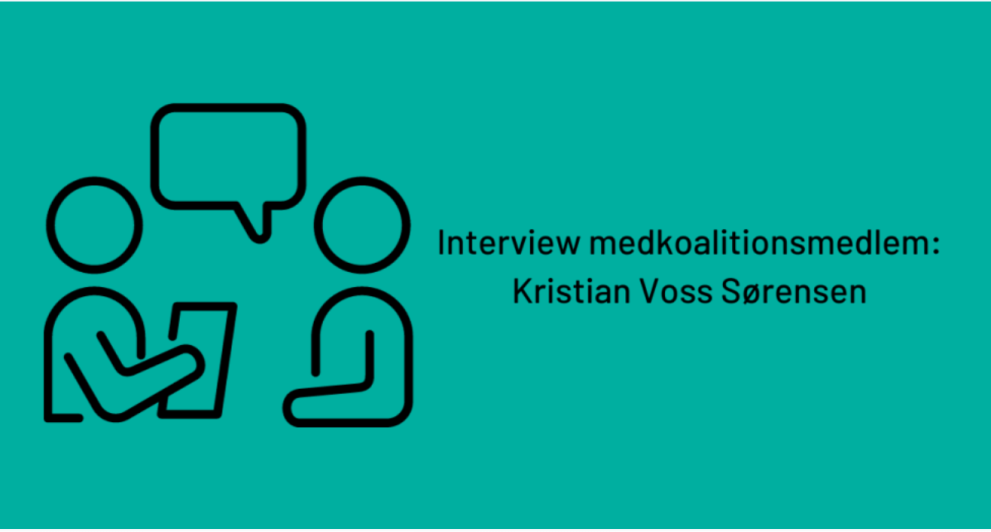
Check out this article, where we have the pleasure of speaking with Kristian Voss Sørensen, CEO and founder of Ensensor Insight. The interview focuses on his trip as an entrepreneur and his views on digitalisation and data-driven business development.
Kristian says he got the idea of starting his own business just a few years ago, after holding a global position where he was responsible for the strategic alliance partners. The aim was to make the company’s data available for new customer segments via third party platforms. Third parties could then combine it with their own data and sell it on to their customers against payment. Just like films and music companies, they make their products accessible via Netflix and Spotify.
"I saw that many of the companies that I had worked with were traditional companies that went through huge digitisation processes. They now suddenly held tons of exciting valuable data and developed digital products. They had to find out how to commercialise the new digital services here, and I could see that their expertise was in some quite different areas. How to package data as a product and how to take the right money for the data product while protecting the company’s Intellectual Property? This was not the core competence of companies, but the company I had worked for, with the world as its market, we did not do anything else and had not done it for the last + 50 years. It is a core competence that is critical for a company in the digital transformation. I therefore thought that traditional businesses could need a person like me to help them through their digital transformation process and how to maximise the value of their data and digital services that come out of it. This was the start of the idea. I have worked to fine-tune and cut the commercial model, and one year ago I had the final model ready, set up my own company and went live".
As a new entrepreneur, you have said yes to the invitation to join the DSJC coalition. What has led you to do so?
When I received the invitation, I read a little about what the coalition was about and what really interested me. In particular, it is the launch of all the new AI solutions that have been made widely available for the first time to the Allese sandy, in principle it can be called. I can see that if you do not really develop your digital skills and are fully up to date on how they can be used, then, in the future, you will be relieved very quickly. That is why I consider the whole concept of the DSJC to be very relevant: How to develop digital skills to become even stronger and more relevant in the labour market? The relevance of time will not be diminished and digital products will continue to be developed with ever-increasing speed and with AI as an incredible potent component as a focus.
We have drawn up a charter in DSJC-Denmark, which also touches on the topics you have dealt with. How does this make you feel?
I think that the world is already very divided into, perhaps a relatively small group of people who already live in a fully digital world, their daily lives. Then there is a relatively big group that may be in touch with digitalisation and uses it little, but not mega-sharply, and it feels a little overwhelming. Then there is a whole group that actually uses it incredibly little. I think that, especially for the group who does not use it at all and for those who may still be somewhat intimidated by it: This is a super-important effort to raise awareness of all the opportunities offered by the digital tools. In fact, they can be a huge help for themselves and with that understanding make it less frightening. I think it is really essential to focus on in order to avoid the widening digital divide in society.
Denmark is a small country where, fortunately, we are very advanced with digitalisation. But Denmark does not have so many of the largest companies, nor is it among the countries in the world that invest the most in digital tools and AI. So it is really important that we stay at the tips and continue to be promoted in the shoes to use our knowledge to make the most of digitalisation and AI. For then, we also have a giga opportunity to position us very strongly in the future, and fast accelerating digital world.
Where can you and your business help make a difference on this AI agenda?
We focus on how to help businesses see how they get the maximum value from the digital transformation, with the data and expertise that derives from it. This may be due to the sudden presence, as part of digitalisation, of incredibly new data which you did not have in the past, but which contains a lot of valuable knowledge and history of the business and sector in which they operate. How to put all the data at stake in such a way that it actually generates some serious added value and growth both for the company itself and perhaps also for their partners, suppliers and customers alike. At the same time, it can be the access ticket for completely new markets both locally and globally. In other words, we can help businesses to gain an insight into and then adopt a strategy to develop the new value they gain from their digitalisation initiatives.
Who is the typical customer?
It is either 100 % digital business already, but it can also be a traditional company that is fully engaged in digitalisation, where they already have a very mature vision of digitalisation and now generate a lot of new data. They must try to find out how to get maximum value out of it. Instead of simply ending as a mere cost. Here we can help put in place a strategy on how to use the company’s data as a huge asset as a product. For example, how to combine the company’s data, perhaps with other external data sources and their expertise, to create an even more valuable product? We can help to create concepts on how to create digital products that can be commercialised either directly or indirectly
In a Danish context, we have a great welfare and education agenda, and we have many in the coalition that represents this area. What do you think should be done further in this area?
I see that education and training institutions cannot really find out how to deal with all what AI does in their education? How should they teach it? How should they ensure that students do not use it in a wrong way so that they chew? Here I think that, as an educational institution, the most important one is to embrace it. Then they need to look at how they need to change the way they teach. It is about ensuring that young people start using these tools as much as possible, because it will be truly central to entering the labour market. They must be as home-like in the tools here as possible and provide added value.
If we look at the educational establishment as a company, can it do something differently with the data it collects?
They can ask themselves what information and knowledge is important for them to provide the best educational institution and teaching? What do we really collect today and collect the right information? It will be very important to ensure that you collect the right information and then look at what it really tells us. What actions can we take as a result of what data tells us to make the best education institution going forward?
Students should preferably match what the labour market needs. If the labour market is very fast in adopting digital tools, digitalising their business, then it is essential that learners already have the right skills and may also be trained in some skills that are slightly more advanced compared to where companies are on their way to prepare for what comes.
Can companies also contribute to the educational promise?
Certainly because they represent the very practical experience. They know what is actually happening on the labour market. They aim to ensure that there is a knowledge sharing from companies to educational establishments. They need to join forces so that when young people enter companies, the type of young people they need. This requires close cooperation in my mind.
You have chosen to be inspired by what is going to happen in the coalition you are now part of. What do you want to work in the Coalition?
I think we need to define some rather concrete areas of focus where the coalition needs to use its energy. For me, it has become extremely clear with the launch of the new AI tools here that it suddenly became universal. This is why it will be essential that we ensure that as many people as possible are actually able to exploit the huge potential of these tools. It has become very clear to me that they, understand and use what they will simply be almost superior to those who do not understand how to use the new tools. And historically, the majority of us may have been most involved in sitting on the side line and more as users of all of these digital products than as digital tools to create new value. Here are examples such as Facebook, Instagram, LinkedIn, which a relatively few use to create new content and business, or the digital tools we use in our work. Indeed, it will be essential to ensure that young people have the necessary education and training so that they can, in the broad sense, move from digital merchants to even more active and value-creating users of the new digital solutions, so I see first priority.
How do we get it into play here as early as possible in their education? So it becomes as natural for them to use these tools as it is to write or count. This is the case in Denmark, but this applies across Europe, and this is true all over the world. We must recognise that in Denmark, and in very limited cases in Europe, there are not very many companies or nations that stand as top investment economies in artificial intelligence. Here, the US and China are more in the top. How will we position ourselves when we do not sit behind the drawing board and design how to develop them here? The responsibility for keeping up to date and actually doing what can be done to learn how to make the best use of these tools is a matter for Europe and nations, but also for each individual.
In your view, what do you think needed to avoid a huge residual group that is not involved in the digital wave?
The best thing is to try to integrate it into education as early as possible. This is the way in which the widest possible reach in society. It does not necessarily solve it for existing generations, but in the long run, it will of course help everyone to have at least a minimum understanding of what these tools can. Companies can do much to provide training to their employees to get a good digital understanding and how to use the data emerging from digitalisation to make the best decisions. It is also a super important foundation to be included in the baggage. It is well documented that the data-driven companies are growing much faster than those which are not. So if you want to ensure the long-term survival of your business, I do not see a choice and that understanding also applies at individual level.
In your view, what is the most important agenda for digital literacy at European level?
It is all AI tools because it is now widely available and so incredibly potent. It is the almond sandy. In principle, it is up to each individual to use it and how much they want to use it. If we are not to end up with a, B and perhaps c/d team, it is important that efforts are made to define a framework for how it can be used. This is particularly true for those companies that invest most in it and focus most on keeping our attention in their products as much as possible. Unfortunately, they are not located in the EU. We must be sure that we will not be used by those who make these tools, but we must also ensure that we do not have such a restrictive framework so that we cannot really get the full value of these tools. On the other hand, we will end up leaving it to non-EU countries and businesses to speed up their own competitiveness.
There are always two sides of a coin. We can be both enthusiastic about digital developments, but we also have concerns. How do we find the balance in it?
I follow all the media in which AI and digital platforms are communicated. There is a quick little to say that it is super-fantastic or that it is superdangerous. I think it is important to try to strike a balance. To bring the full potential of the new digital tools to the full, but also to define a strong framework for protecting individuals from how digital solutions can make inappropriate use of our digital solutions. At present, it is the wild West in the digital world. Many of the companies that develop the most successful apps we use almost all. They have developed them primarily with commercial intent, and we are all being absorbed more and more into these apps, and it is easy to disappear in them.
You don’t know if it is good information, bad information or fake news? Here, it is important to strike a balance so that we both protect but also get the maximum value out of it. It is of course something that I know the EU is working very much on, and I think it is important. But if it is seen all in a global context, the EU must also take care not to make such a restrictive framework so that we can suddenly risk being set off, because other countries and businesses outside Europe do not have to fall short of those rules, and they can suddenly have a huge competitive advantage because they can play us completely in the course. This can easily happen if we have become too restrictive and close ourselves.
It is really all the data that emerges from digitalisation. After all, I come from a world where it is a question of making data, information and knowledge accessible so that people can make the best decisions, and digitalisation is mainly discussed in the context of technology. It also makes very sense because the technology is just as it is the main backbone of digitalisation. However, for me, the most important and most interesting is all the data that digitalisation generates and the knowledge associated with it. Indeed, I believe that it is in the collection and merging of different types of relevant data that will enable us to understand some of the most important issues in the world. Here we can find the solutions to some of the most difficult issues we face. Here, technology is really more that makes digitalisation possible and where data is the real knowledge we get out of digitalisation, ensuring that we can understand our world better and then find out how we solve the big and small issues better than today.
Kristian has his own consultancy firm, where he helps companies make the most of digitalisation and all the data and knowledge that emerges from it and how to maximise the value of the data. He has more than 20 years of global experience in the international information sector, working on many different roles from sales and product development to strategic partnerships and selling digital products for more than $100 million throughout his career.


